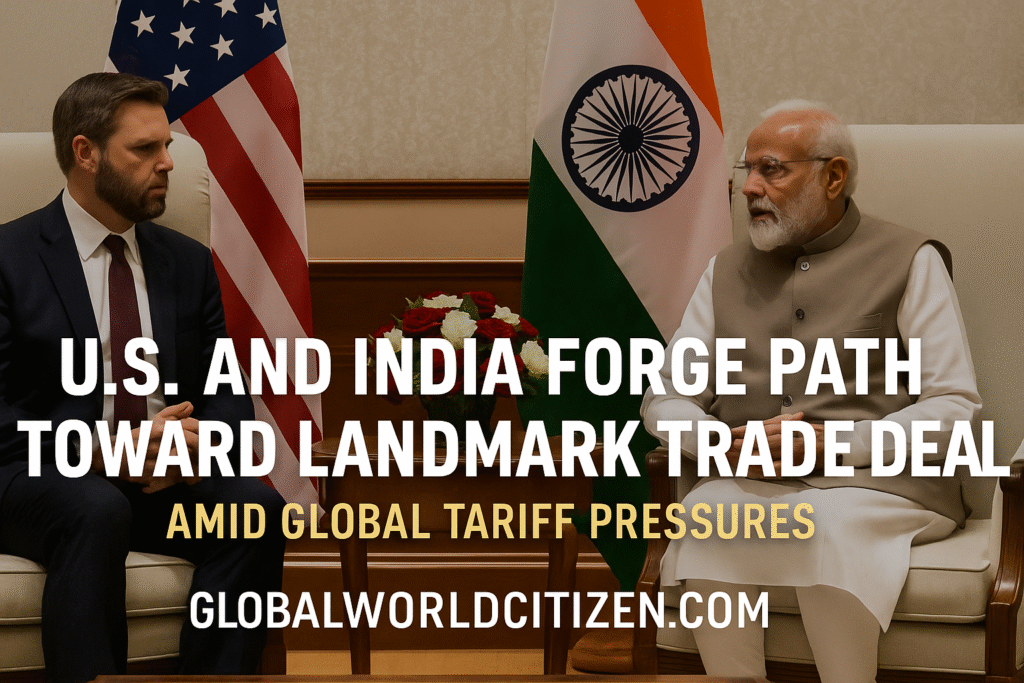Published: April 22, 2025 ✍️ Author: Global World Citizen Editorial Team 🌐 Source: GlobalWorldCitizen.com

The United States and India have made significant diplomatic and economic progress toward establishing a modern bilateral trade agreement, following critical high-level talks in New Delhi between U.S. Vice President JD Vance and Indian Prime Minister Narendra Modi.
The meeting concluded with the announcement of a finalized terms of reference — the first formal step toward drafting a comprehensive U.S.–India trade deal aimed at boosting cooperation across digital commerce, manufacturing, and global supply chains.
 Why This Trade Pact Matters Now
Why This Trade Pact Matters Now
India, Asia’s third-largest economy, is urgently working to shield its key exports from Trump-era tariffs that could rise to 26%. A 90-day tariff pause, granted by the U.S. in early April, has given India an opportunity to pivot — using diplomacy to reshape the future of U.S.–India economic relations.
“India is better placed than its regional rivals,” said economist Amitendu Palit (National University of Singapore). “Given the pace of negotiations, India has a strong chance of securing long-term relief.”
 Key U.S. Trade Goals in India
Key U.S. Trade Goals in India
According to the U.S. Trade Representative’s Office, the Biden-Vance administration aims to secure:
Expanded market access for U.S. goods and services
Reduced tariff and non-tariff barriers in Indian markets
Stronger regulatory and intellectual property protections
These objectives are part of a broader U.S. push to counterbalance China and reinforce alliances with other major emerging markets.
 GlobalWorldCitizen.com Insight: Economic Alliances Are the New Diplomacy
GlobalWorldCitizen.com Insight: Economic Alliances Are the New Diplomacy



 What Comes Next?
What Comes Next?
Both governments have set a fall 2025 deadline to finalize the first phase of the agreement. Vice President Vance, joined by his wife Usha Vance and their three children, also attended a private state dinner hosted by Prime Minister Modi.
Next, Vance will deliver a speech in Jaipur, focusing on shared U.S.–India priorities such as:
Innovation & Digital Trade
Green Tech & Clean Energy Collaboration
Strategic Supply Chains & Cybersecurity
 Voices of Leadership: A New Era of U.S.–India Relations
Voices of Leadership: A New Era of U.S.–India Relations
Nirmala Sitharaman, Indian Finance Minister:
“India’s most important trading partner is the United States of America… That importance is fully recognized by the current Indian government.”
Prime Minister Narendra Modi added:
“We look forward to welcoming President Trump later this year. Our nations are ready to move forward — together.”
 Follow GlobalWorldCitizen.com for Ongoing Updates On:
Follow GlobalWorldCitizen.com for Ongoing Updates On:
U.S.–India trade agreement developments
Tariff diplomacy and geoeconomic realignments
Global South economic growth and inclusive trade models
Strategic technology partnerships shaping the digital economy
In an interconnected, rapidly evolving world, Global World Citizens must stay informed, engaged, and empowered.



